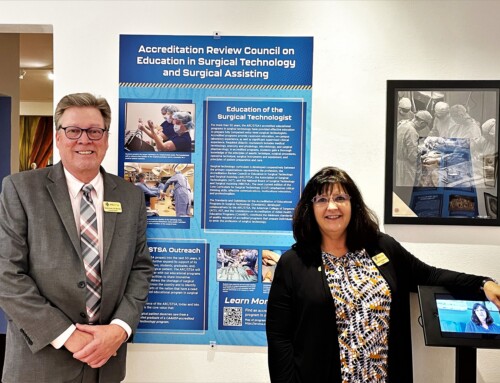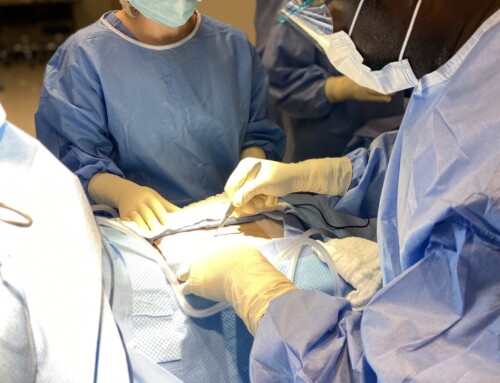5 Tips for Students to Prepare for Clinicals and Beyond
 Featuring tips and advice from Paula Marentay, Educational Nurse Coordinator at the University of Michigan Health System
Featuring tips and advice from Paula Marentay, Educational Nurse Coordinator at the University of Michigan Health System
Soft skills such as professionalism aren’t always taught in the classroom, but for students, they are a critical companion to the technical skills learned in the laboratory and clinical rotations. We spoke with Paula Marentay, educational nurse coordinator at the University of Michigan Health System, to get her thoughts on the soft skills students should hone. Considering clinical rotations can be “a 12- to 13-week job interview,” as Marentay notes, it never hurts to keep these soft skills sharp. Here are a few tips for students, that educators can emphasize in the classroom.
- Show up on time – all the time – and hold yourself accountable. Marentay tells her students, “If you don’t show up, you’re no good to us. It doesn’t matter what kind of skills you have.” While being punctual seems like an easy skill to practice, it doesn’t come naturally to everyone. Students should factor in every part of their commute, including the time it takes to enter the parking lot and arrive at their unit. Marentay jokes that the University of Michigan’s parking lot is unwieldy, but for students at larger facilities, the reality is that it may take extra time just to get inside the building, and that should be factored into their commute time. Students should also take personal responsibility for their arrival. Marentay recalls two students who were commuting together from a long distance, but one student was making the pair habitually late. Both were spoken to, and the one not causing delays was told to consider driving on her own. It didn’t matter that it was her classmate causing the issue, because she was still arriving late. “She started driving on her own and she was never late after that,” Marentay recalls. “We ended up hiring her. We did not hire the other student.”
- Be mindful of your conversations. Language is a powerful tool that can make or break your career. Marentay notes students have had inappropriate conversations or used unprofessional language in the operating room (OR). “We’ve had to let people go because, even after having a discussion with them, they continue to show this behavior,” Marentay says. Students should understand that they are representing the hospital or facility for which they work. They must put their best foot forward, not only to prove they are capable of handling the job, but to be a positive influence around patients, who may be undergoing stressful procedures.
Marentay notes she also looks for students who have good customer relationship skills. If a student’s resume shows past jobs waiting tables, working in retail or other customer service jobs, Marentay considers that a valuable experience. While these jobs don’t provide the technical skills needed in the OR, they do provide a basic foundation for interacting with others on a daily basis.
- Practice, practice, practice. Going into an interview cold, in any field, can hurt your chances of getting the position you want. Marentay encourages students to take advantage of mock interviews and be prepared to answer all possible questions. “It doesn’t look good if students can’t answer your question,” Marentay says. Educators can hold mock interviews in their classrooms, having the students work together in small groups. Job fairs are also a good opportunity for students to interact with potential employers and put their practice to good use.
- Be adaptable and adjust to the situation you’re in. Students going through clinical rotations will quickly find that every operating room is different. Marentay specifically notes her students have to learn what the hospital counts in the OR – whether it’s pens, needles or other miscellaneous items – versus what other institutions count. “Those are the small little hurdles that take time to figure out, in addition to the amount of instrumentation we use in some of our services, which can be a lot to adjust to.” With each new clinical experience, students should remember there will be a learning curve and they should allow themselves time to adjust. They may not get things right perfectly on the first try, but with time and experience they will start to feel comfortable in their new setting.
- Don’t be afraid to challenge yourself. When reviewing resumes, Marentay looks for clinical experience at other large facilities. If the graduate has only worked at small ambulatory sites, there is concern for how they might adapt to a larger setting. With this in mind, Marentay says students should challenge themselves and take advantage of opportunities to gain broader experience. “We try to encourage students to stretch their boundaries and do as much as they possibly can while in clinicals. That’s the only way their skills are going to improve,” she notes.
A bonus tip for educators: Model good behavior. While students are responsible for their own actions, it’s equally important for educators to model professional behavior. Educators set the tone – verbally and non-verbally – for what is expected of their students. Marentay says she and her fellow educators discuss this often. “We agree that when you come into work there’s a smile on your face and you say hello to everyone. You’re on display, setting the example, making sure your attire is appropriate and you’re coaching your students appropriately.”
Although these skills are difficult to teach, with enough practice, experience, and guidance from educators and mentors, students can develop into team players, reliable employees and leaders in their field. What soft skills do you emphasize with your students? Let us know on Facebook or LinkedIn.



